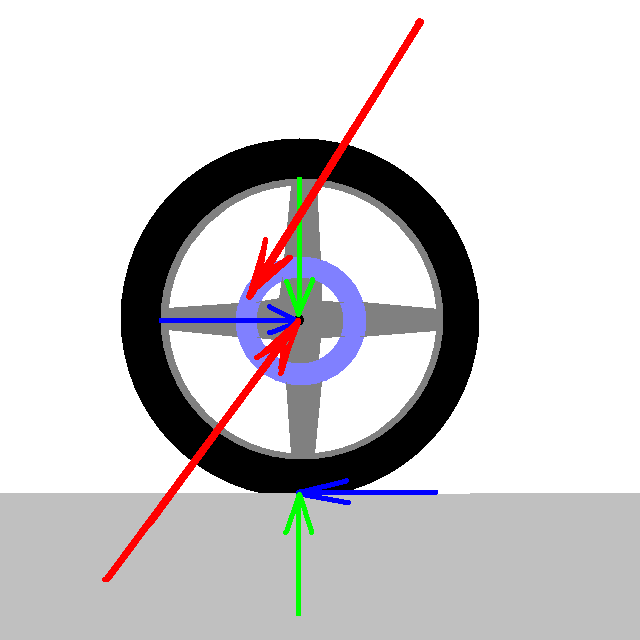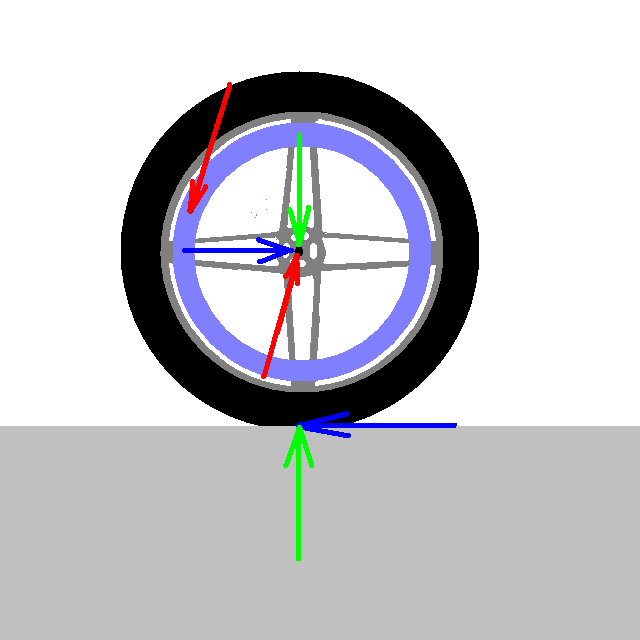| Author | Message | ||
Snowscum |
 | ||
Brineusaf |
brakes* Dual ZTL...nice | ||
Pwnzor |
Looks about twice as heavy as mine  There's a guy at the local hangout here most Sundays with a muffler just like that one, but he fabbed it himself. | ||
Cochise |
Be Choosy, ride a Guzzi!! | ||
Brineusaf |
http://www.monkeyshop.de/gif/news16.jpg Lights bring the Sachs Madass to mind | ||
Blake |
Not ZTL. Not even close. 1. The wheel is conventional/heavy, not ZTL/light design. 2. The disks are mounted outboard of and protrude well outside of the rim in harm's way. 3. Not full floating. 4. Larger diameter disks approaching diameter of rim would cause undesirable gyro effects at speed, especially for two such disks. Wheel assembly rotational inertia is significantly increased. 5. Two disks required instead of one? So much for any unsprung weight advantage. It is now an added unsprung weight disadvantage. | ||
Jandj_davis |
Blake, I think you are reading too much into the ZTL moniker. "Zero Torsional Load" simply means that there is no large transfer of torsional forces going through the wheel during braking. I'll bet the patent on the "ZTL" braking system doesn't say anything about the rotors being inside the rim, or being full-floating, or rotational inertia (That one cracked me up, you really had to reach for that one). So, sorry, those are ZTL brakes in the purest definition. They are not nearly as well thought out or neatly executed as Erik's, but they are still the same concept. | ||
P0p0k0pf |
:shrug: that picture seems a little photoshopped... | ||
M1combat |
There is more than a single patent included in the "ZTL" system. That's not a "ZTL" brake. It's a perimeter mounted rotor and everything Blake said is correct. Rotational inertia is exceedingly important BTW and Blake is right on that one as well. Above 100 that system would require a fair bit of muscle to heal over quickly. Do you realize that for every action (Pushing on the inside bar to initiate lean) that there is an equal and opposite reaction (Pushing on the peg/seat/pulling on the outside bar)? Low rotational inertia is important AND changes the handling dynamics of a motorcycle dramatically at speed. "Blake, I think you are reading too much into the ZTL moniker. " Hmmm... Are you sure that you aren't reading too little into copyrights, patents and intellectual property rights? "ZTL" - It's what's for dinner. Perimeter mounted rotors are dogfood  . They're fairly useless for anything but bling. . They're fairly useless for anything but bling. "So, sorry, those are ZTL brakes in the purest definition." No... They aren't. They're really cool but mostly useless perimeter mounted brakes. | ||
Snowscum |
 Sorry about the typo. I seen that after I posted and couldnt edit it. Or at least dont know how. Thought it was interesting to see that type of brake on another bike. One on either side of the wheel. Here is their website. http://www.ghezzi-brian.com/models_stw.htm | ||
Brineusaf |
right.... you boys play nice | ||
Tx05xb12s |
Hey guys, I've always wondered what "full floating" disks means? I don't mean to hijack, but thought this would be as good a place to ask a stupid question as any. | ||
Scott_in_nh |
M1 and Blake, everything you are point out that sucks about those brakes are right on the money, but while they may not be the patented "ZTL System" they are Zero Torsional Load regardless of the other effects they have on handling. Gotta go with Brineusaf and Jandj_davis on this one.... | ||
Pwnzor |
Hey, don't disturb the cheerleaders! | ||
M1combat |
Then we're talking semantics  . No problems here . No problems here  . . | ||
Scott_in_nh |
Hey, don't disturb the cheerleaders! oops, forgot where I was!  | ||
Blake |
I'll bet the patent on the "ZTL" braking system doesn't say anything about the rotors being inside the rim, or being full-floating, or rotational inertia" You'd be hard pressed to be more inaccurate. "ZTL™®" describes the patented Buell™® front brake and wheel system. It is absolutely inaccurate and horribly unethical to refer to any other front brake/wheel system than Buell's as "ZTL™®." Scott, yes, any rim-mounted or perimeter-mounted brake will avoid putting torsional braking forces into the wheel spokes and hub. I agree. If however the wheel is not designed to exploit that lack of loading, then it is not a zero torsional load wheel; it in fact is a wheel whose hub and spokes have been designed to carry torsional loading from braking. That dual perimeter disk brake system is what a competent engineer would call "taking part of a good idea and making it into something really really bad." It is the exact opposite of what good engineers strive for. Equating that engineering abomination to the Buell™® ZTL™® brake/wheel system is unacceptable; at least to this engineering professional. I do like the Moto Guzzi though. Very cool bike. | ||
Pwnzor |
Give me an E! Give me a T! Give me an H! Give me an I! Give me a C! Give me an S!         | ||
Al_lighton |
Looks an awful lot like the perimeter disc system that Braking (the company) released for the tube frames in about 2001. Rex has them on his M2, the defunct Battle 2 Win magazine had a review of the system. General consensus, gave excellent braking, more than what was needed, but the extra weight slowed steering considerably. A.S.B. sold the setup for a while, didn't sell many, Braking discontinued them. Al | ||
Trojan |
As Al says, the Ghezzi & Brian uses the Braking twin perimeter system. it has been on the market for years and was tried in World Superbike a couple of years back by Ten Kate Honda. It is a lot heavier than standard brakes (even with the Marchesini wheel) and gives no discernable advantage. Just looks nice. It wasn't just the extra weight that upset the steering. Applying the brakes when cranked over, or trying to 'trail brake' into a turn resulted in the bike heading straight on! The latest Ghezzi & Brian designs have reverted back to standard type radial Brembo calipers as used on the 999 Ducati, although attached to some HUGE Marzocchi forks  . .  (Message edited by trojan on November 03, 2006) | ||
Blake |
Ten Kate tried the rim brakes on a WSB racing machine? Why the heck would they do that?  Braking sponsorship? Braking sponsorship?  "Applying the brakes when cranked over, or trying to 'trail brake' into a turn resulted in the bike heading straight on!" I'm stretching my physics and mechanical engineering knowledge to new limits but not finding any way that the brake configuration could be a direct cause of that. That is a chassis/suspension/tire issue. Nothing I can conjure would allow the front brake system to have such an effect. | ||
Jayvee |
Wouldn't those brakes on the Guzzi (what ever you call them) allow the greatest swept area reasonably allowed by the rim, with the least amount of disc-carrier weight? If they were either thinner, narrower, or made of carbon-fiber, (or all three) seems like their weight contributing to a gyroscopic effect could be minimized. As to the wheel being lightened due to where the brake is, I have trouble comprehending that anyway, despite the Buell "gospel". What portion of the total forces applied to a wheel are due only to the brake loading? If they put the same science strictly to wheel design, I would bet most cast wheels are way heavier than they need to be. Bet they just applied some science to how strong wheels really need to be, and found they could lighten them. I'd wager the exact same wheels would work just fine on my M2 with conventional brakes. Especially given how infrequently I even brake hard. I'd guess there's more variability in how hard people brake than the amount of weight that can be shaved and attributed to the TL factor. | ||
Blake |
Greater swept area? Yes. Least amount of carrier weight? No less than the Buell ZTL™® Thinner would be lighter, yes. Narrower would be lighter, yes. Carbon would be lighter, yes. But... Too thin and the rotor becomes unstable. Too narrow and the pads overheat. Carbon disks do not yet perform acceptably for street use. I like diagrams...  Conventional Wheel/Brake Loads & Reactions (Free Body Diagram)  Buell ZTL Wheel/Brake Loads and Reactions (FBD) An explanation and more of the same kind of discussion, a lot more, more than you probably can stand, can be found here.  "I'd wager the exact same wheels would work just fine on my M2 with conventional brakes." If you never intend to use the front brake, you might be correct. Otherwise, I'd wager that! How much are you willing to wager?  "What portion of the total forces applied to a wheel are due only to the brake loading?" In terms of design loads for conventional wheels, 100% of the torsion induced shear stress in the hub and spokes is due to brake loading. The braking induced tension/compression design loads are probably around 40% or so of the total tension/compression loading. But that doesn't change with a ZTL. The ZTL only eliminates the circumferential (torsion induced) shear loading. It is significant. If you ever scrutinize and compare a ZTL wheel to a conventional cast aluminum alloy sport bike wheel, you won't be able to miss the drastic difference. Air is almost always lighter than aluminum.  You astutely note that the wheel, any structural component really, must be designed to handle the worst cases of extreme operational loading; for a motorcycle front wheel that would include aggressive stoppie-inducing braking combined with hitting a really bad bump, maybe even while getting the front end a bit sideways. Though you may not use it in your normal well-paced riding, you'd hate to actually need the full braking capability and not have it because upon grabbing a handful of front brake the front wheel spokes suddenly turned into something resembling wet noodles. Also, strength is not the only factor, a front wheel must also be rigid/stiff enough to prevent unwanted oscillations. Imagine welding a shaft to the bearing seats of the wheel then clamping that shaft solid. Now imagine grabbing the wheel like a big rig's steering wheel or a ship's wheel and crank on it with all your might. Can you see how the spokes will want to bend into an "S" shape as the rim rotates about the clamped hub and the spokes have no good way to resist? Now let go, crank the wheel again, repeat, repeat, repeat. Sooner or later one of the spokes will crack and fail, then another, and another. Then all remaining will bend and fail catastrophically. A conventional wheel will not suffer that fate. It is designed to carry a lot of torsion induced braking loads in its spokes.  |